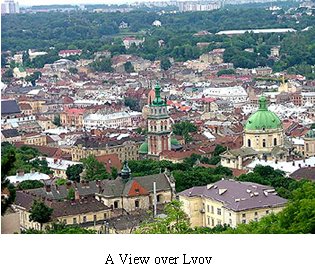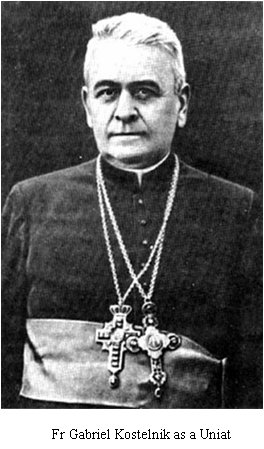![]()
Hieromartyr Gabriel of Galicia (1886-1948):
A Carpatho-Russian Martyr for Christian Unity in Western Russia
moved from events 2006

In 1596, at Brest now in south-western Belarus, hundreds of thousands
of Orthodox living on the borderlands of western Russia left the Church.
Oppressed by Polish Roman Catholic tyranny, they had been forced into
schism from the Orthodox Church through the fraud of Uniatism. This divisive
event, known ironically as the 'Union of Brest', was to cast a dark shadow
over the whole region's ensuing history. The schismatic political intrigues
of the Vatican and the violence of its Polish servants tore away whole
provinces of western Russia from unity with the Universal Orthodox Church.
The tragedies that followed and the acts of Roman Catholic mass murderers
like Archbishop Josaphat Kuntsevich (1623) or the Priest Andrew Bobola
(1657), both canonized by the Vatican, like the twentieth-century war
criminal Archbishop Stepinac of Zagreb, have left Orthodox there with
no illusions about the true nature of Rome.
Fortunately, in more favourable political conditions, many Uniats later returned from schism to the Faith. Thus, nearly two hundred and fifty years later in 1839, at the Council of Polotsk, hundreds of thousands of Uniats in Belarus, Volhynia and Podolia, once separated from Orthodoxy through violence, returned to Orthodoxy through love. At the end of that century some 90,000 Uniat immigrants from Galicia and Carpatho-Russia in the USA, now freed from Austria-Hungarian tyranny, also returned to Orthodoxy. From 1900 on, their example was followed by Carpatho-Russian Lemkos in Austria-Hungary, like Hieromartyr Maxim of Gorlice. And from about 1900 on, tens of thousands of other Carpatho-Russians to the south, led by St Alexis of Carpatho-Russia, also began the return to the Church. After 1918, finding themselves in Czechoslovakia, their movement to embrace the Church continued.
Between 1918 and 1939, Uniats in Galicia also gradually began to return to Orthodoxy, despite ferocious Polish repression,. By 1928, there were 40 Orthodox parishes there and eventually some 50,00 returned to Orthodoxy. However, repression continued there until the Second World War. Sadly, under instructions from the Vatican, after 1939 the latinized Uniat episcopate showed enthusiastic loyalty to the new Nazi regime. Indeed, the head of the Uniats in Galicia, 'Metropolitan' Andrei Sheptitsky, actually 'blessed' the 14th SS Division, recruited in Galicia, and their genocidal massacres. Senior Uniat clergy in Galicia also supported nationalist Ukrainian organizations. These were notorious for their murders of Communists, Jews, Poles and Orthodox clergy and they continued their terrorist activities into the early 1950s. As a result, after World War II, Sheptitsky's successor, Joseph Slipy, and four other Uniat bishops were arrested by the new Soviet regime for collaboration with the Nazis, as were quislings throughout liberated Europe.
However, on a happier note, on liberation from both pre-war Polish oppression and wartime Nazi oppression, other Uniats in Galicia decided to seize the long-awaited opportunity and return to the Orthodox Mother-Church. Thus, on 28 May 1945, in Lvov, a Uniat Archpriest, Fr Gabriel Kostelnik, and other Uniat clergy set up a group with the express aim of reuniting with the Orthodox Church. There can be no doubting the sincerity of the motives of these clergy, in particular of Fr Gabriel, who had long shown his attachment to Orthodoxy.

Born in 1886, Fr Gabriel was Carpatho-Russian by origin. He had studied in Zagreb, then at the Theological Academy in Lvov and Freiburg University, where he had obtained a doctorate in philosophy. An excellent academic theologian and Church historian, he was also a poet and philosopher. Ordained priest in 1913 in Lvov, he had served at the Cathedral of the Transfiguration there and worked as Professor at the Lvov Theological Academy. His study of the Church Fathers had convinced him of the truth of Orthodoxy. In 1930 he had expressed his views in print, for which he had been deprived of his post at the Academy. He had continued to write his critique of Catholicism throughout the 1930s and was convinced of the theological erroneousness of Uniatism and its pernicious anti-ecclesial nature.
In 1945, Fr Gabriel's group, calling for a return to the Mother-Church, were not voices crying in the wilderness. In Moscow, the newly-elected Patriarch Alexis I welcomed the desire of Uniat clergy and faithful to return to the bosom of the Mother Church and leave the heresies of the Vatican. On 23 February 1946, Metropolitan John of Kiev received Fr Gabriel and twelve other Uniat priests into Orthodoxy. By the end of the month two of these priests had been consecrated bishops. On 8 and 9 March 1946 a Council took place in St George's Cathedral in Lvov, presided over by Fr Gabriel. The two new bishops and the other ex-Uniat clergy were also present. Other Orthodox bishops also took part, as well as 204 Uniat priests and a few laypeople.
The main speaker at the Council of Lvov was Fr Gabriel. He affirmed what all Orthodox know, that the 'Union' of Brest was the greatest catastrophe ever in the spiritual and national life of western Russia. Fr Gabriel called for the return of all Uniats to the Faith of Kiev, 'the Slav Jerusalem', the Orthodox Mother-Church and for freedom from papist tyranny and heresy. The following morning all 204 Uniat clergy renounced the Latin errors. They were united with the Orthodox Church through the sacrament of confession by the newly-received ex-Uniat clergy. This was followed by the concelebration of the Divine Liturgy. A message was sent to Patriarch Alexis, which welcomed the day of spiritual freedom that had arrived, announcing the reunion of Uniats with the Orthodox Church and the Universal Faith of the First Millennium. However, the newly-received clergy recognized that it would not be easy to reunite all the Galician faithful with the Church. Their act was only a beginning and it would be hard to overcome the blind prejudices and brain-washing of 350 years since the Brest Union.
Therefore, the Council also sent out a message to all Galician Uniats. This message reminded them of how the Unia had been foisted on them by the Vatican and the Polish authorities and how it had destroyed the spiritual unity of the Ukraine and all Russia. They called for liberation from Latin oppression and Polonization and recalled how the Orthodox Church is the first Church of both East and West. All other so-called 'Churches' had been formed through schism and heresy from Her. In returning to Orthodoxy, they would return to the Faith of their forebears and all other Ukrainians. One month later, on 5 April 1946, Fr Gabriel led a delegation from the Council to Patriarch Alexis in Moscow. Fr Gabriel was made Protopresbyter, the highest honour possible for a married priest.
The majority of Galician Uniats began to follow the Orthodox movement and were received into the Orthodox Church. They came to the Orthodox churches, confessed, took communion and baptized their children. For the most part, they were sincere, many had always thought of themselves as Orthodox in any case. Within a year of the launch of the Orthodox movement, altogether 997 Uniat priests, 78% of the total in Galicia, had joined Fr Gabriel's group and returned to Orthodoxy. However, although there can be no doubt that the Uniat clergy at the Council of Lvov had been sincere in wishing to unite with the Orthodox Church, the problem was that some of these latecomers were not. Indeed, several of them were in reality opportunists, taking advantage of the fact that Galicia was now part of the anti-Vatican Soviet Union. They were therefore only acting to save their skins under the cover of Orthodoxy.
For the Orthodox Church, here was a difficult situation. On the one hand, it could clearly not turn away the sincerely repentant, as those at the Council of Lvov who loved Orthodoxy. On the other hand, it also knew that, under Soviet atheism, the fate of Uniats who had collaborated with Hitler was almost certain death. In the end, the Orthodox bishops showed mercy and generosity, protecting the sincere and the opportunist alike from Soviet oppression. Thus it received into the Church all who asked, regardless of whether they were sincere, or simply frightened of the NKVD.
The responsibility for the spiritual tragedy of those Uniats who hypocritically united themselves to the Church lay not with Orthodoxy, but with two other groups. First of all, there were the anti-Russian and anti-Orthodox Uniat leaders who, through their Vatican-sponsored alliance with the Nazis during the Second World War, had clearly taken an anti-Soviet position. Secondly, there were the Soviet Communists, who ruthlessly repressed their political enemies. For them, these included not only the leaders, but also ordinary and sincere, if Latinized and misled, Uniat clergy and laity, compromised by Fascism.
It is also true that not all such Uniats were venal. A handful of misguided Uniat clergy and laypeople remained faithful to the Vatican and sacrificed their freedom to do so. Several Uniat clergy, some of them actually innocent of collaboration with Fascism, were 'liquidated' by the Soviet Secret Police, the NKVD. Their repression obviously had nothing to do with the Orthodox Church, which had no political power, having itself suffered atrocious persecution ever since 1917. The repression of Uniatism was the affair of the Soviet Communist Party and the NKVD, which were seeking revenge for Uniat collaboration with Hitler.
The situation meant that by 1959, of 3,431 Uniat parishes registered in 1946, 3,222 had become Orthodox. By 1961, of 1,643 former Uniat priests, 1,243 had become Orthodox and 347 remained Uniat. As we have already said, there is no doubt that many of these were not sincere. This became obvious when, after the fall of Soviet tyranny in the 1990s, many Galicians returned to Uniatism, mainly on nationalistic grounds. On the other hand, it must be said that many who returned to Orthodoxy after Lvov were very brave. Many newly Orthodox clergy and laypeople were to be murdered by fanatics of the Ukrainian nationalist movements.
The outstanding
example was Fr Gabriel himself. Immediately after the Divine Liturgy on
28 September 1948, on the steps of the Cathedral of the Transfiguration
in Lvov, Protopresbyter Gabriel Kostelnik fell victim to a Ukrainian terrorist.
His assassin, one Vasily Pankiv, committed suicide immediately afterwards,
thus symbolizing the realities of those who resist the truth of Orthodoxy
- spiritual suicide. Thus, Fr Gabriel paid with his blood for his faithfulness
to Universal Orthodoxy.
May his memory be sacred to all of us who, beyond western Russia, seek
for true Christian unity in the Orthodox Church of Christ. May his memory
also guide the western Ukraine through these present difficult years.
And may the Truth of Christ triumph over heresy, schism, spiritual fraud
and all political, nationalistic and religious fanaticism.
Holy
Hieromartyr Gabriel, pray to God for us!